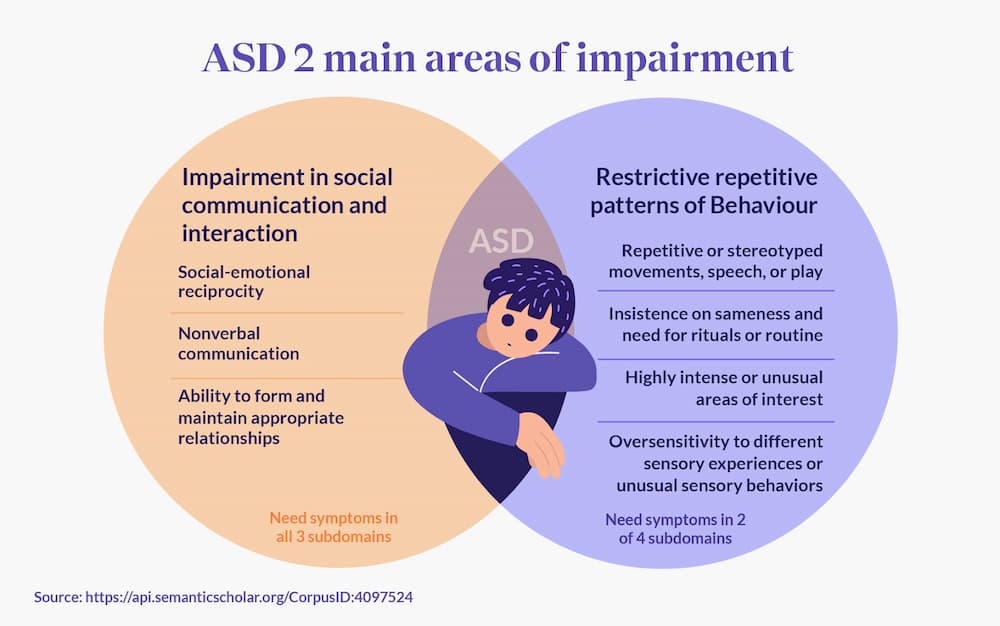The role of structured routines help children with autism—according to an Autism Therapist
The role of structured routines help children with autism—according to an Autism Therapist
Blog Article
Key Symptoms And Signs to Acknowledge in Individuals With Behavioral Autism
When you experience somebody with behavior autism, acknowledging essential indicators and signs and symptoms is necessary. Furthermore, sensory sensitivities can lead to frustrating experiences.
Challenges in Social Communications
When you engage with someone on the autism spectrum, you could discover they battle with social cues and communication. These obstacles can make social interactions feel frustrating for them.
Additionally, you may locate that they prefer routines and acquainted setups, which can limit their desire to participate in new social circumstances. They might talk about their passions in excellent information without discovering if you're interested when they do involve. This can cause one-sided discussions that leave you feeling separated. Recognizing these obstacles can help you come close to communications with compassion and perseverance, cultivating a much more comfy environment for both of you.
Trouble With Verbal and Non-Verbal Communication

Non-verbal interaction can be a lot more tough. You might see an absence of eye contact or minimal use of motions, which can make interactions really feel awkward. Face expressions may not always straighten with the conversation, resulting in complication about their sensations. Recognizing these indications is essential, as it assists you far better support and involve with individuals on the autism range. By comprehending their communication difficulties, you can cultivate extra significant connections and give a more helpful setting.
Recurring Behaviors and Regimens
Interaction challenges typically go along with other indications of autism, such as recurring actions and a strong preference for regimens. You could see that individuals with autism frequently take part in certain, repetitive activities, like hand-flapping, shaking, or duplicating phrases. These habits can supply convenience and a feeling of control in an often frustrating globe.
Regimens are similarly crucial; several individuals thrive when they follow a structured schedule. You might locate that adjustments to these regimens can cause significant distress. If they have an everyday routine of consuming morning meal at a details time or following a particular path to institution, any disturbance can create stress and anxiety.
Recognizing these patterns helps you recognize their habits and offer assistance. By fitting their need for regular and enabling repetitive activities, you can create an extra comfy environment that reduces their difficulties.
Sensory Sensitivities

Typical Sensory Triggers
Sensory sensitivities can significantly influence every day life for people with autism, as particular stimuli commonly trigger overwhelming responses. Common sensory triggers include loud sounds, intense lights, and strong smells. You may see that sudden noises, like alarms or sirens, trigger anxiousness or distress. Similarly, fluorescent illumination in shops can really feel severe and awkward. Textures can likewise play a considerable duty; harsh fabrics or specific food structures might be excruciating for you. In addition, crowded areas can bewilder your detects, making it tough to unwind or focus. Understanding these triggers can assist you manage your atmosphere better. By recognizing what impacts you, you can take steps to lessen discomfort and enhance your everyday experiences.
Behavioral Reactions Explained
Recognizing your behavioral actions to sensory level of sensitivities is necessary, as they frequently expose just how you communicate with the globe. You might also discover visit this site on your own seeking certain sensory experiences, like deep pressure or peaceful atmospheres, to aid ground yourself. Acknowledging these patterns helps you understand your requirements far better and can guide exactly how you interact them to others.
Coping Approaches Overview
Acknowledging your sensory sensitivities is simply the initial action; now it's time to explore coping strategies that can aid you take care of those experiences properly. Beginning by producing a sensory toolkit tailored to your needs. Developing an organized routine can also give predictability, lowering anxiousness around sensory overload.
Limited Rate Of Interests and Focus
While many people develop a variety of interests, those with autism often show restricted passions and an extreme focus on details topics. You might observe that someone with autism can invest hours delving right into their preferred topic, whether it's a specific kind of train, a details motion picture, or a scientific idea. This extreme focus isn't simply a pastime; it can become a central component of their identity and social communications.
You may locate that conversations focus on these passions, and they may have a hard time to participate in more comprehensive topics. For them, these concentrated interests give comfort and a feeling of proficiency. While it is essential to urge exploration of brand-new topics, appreciating their interests is equally crucial. By understanding and recognizing these restricted passions, you can foster a helpful setting where they feel valued and comprehended, permitting more significant links and communications.
Psychological Law Difficulties
Individuals with autism typically deal with challenges in emotional law, which can be affected by their extreme concentrate on specific interests. You could see that when a person is deeply engaged in a preferred task, they can experience solid emotions, whether excitement or frustration. This strength occasionally makes it difficult for them to move gears or handle their feelings when points do not go as planned.

Variability in Developmental Turning Points
When it comes to developmental turning points, you'll observe that people with autism frequently show a wide variety of variability. Some may hit turning points promptly, while others might hang back or development at a various speed. You may see a kid stand out in language abilities but struggle with social interactions. This disparity can be confusing, as standard standards don't constantly apply.
It's necessary to acknowledge that each individual's journey is unique. Some might create complicated skills early, only to encounter obstacles in the future. Others may take longer to achieve basic landmarks however then thrive in details locations. Observing these patterns can assist you understand their strengths and requires much better.
Regularly Asked Concerns
How Is Autism Detected in Children and Grownups?
To identify autism in children and grownups, professionals evaluate habits, communication abilities, and social interactions. They frequently make use of standardized examinations, interviews, and monitorings to figure out if an individual fulfills the criteria for autism range disorder.
Exist Different Kinds Of Autism Range Disorders?
Yes, there are different kinds of autism range disorders, consisting of Asperger's disorder and pervasive developing disorder-not or else specified. Each type differs in severity and qualities, so recognizing these distinctions can assist you far better support people with autism.
What Treatments Work for People With Autism?
When considering reliable therapies for people with autism, you'll discover options like Applied Habits Evaluation, speech treatment, and work treatment. Each strategy can help improve communication, social abilities, and day-to-day functioning customized to specific needs.
Can Individuals With Autism Lead Independent Lives?
Yes, individuals with autism can lead independent lives. With the ideal assistance, abilities training, and sources, you can aid them develop self-sufficiency, manage everyday tasks, and flourish in different settings, cultivating their freedom.
Just How Can Family Members Assistance Loved Ones With Autism?
You can support your loved ones with autism by creating a structured atmosphere, motivating their rate of interests, practicing persistence, promoting interaction, and advertising social abilities. Celebrate their accomplishments, despite exactly how little, and develop a helpful image source neighborhood.
Although numerous individuals on the autism spectrum can make use of and recognize language, they often encounter substantial obstacles with both non-verbal and spoken communication. Acknowledging these signs is important, as it helps you better assistance and involve with individuals on the autism spectrum. You could see that people with autism typically involve in details, repetitive actions, like hand-flapping, shaking, or duplicating phrases.Sensory sensitivities can considerably influence everyday life for individuals with autism, as particular stimuli frequently trigger frustrating reactions.When it comes to developing turning points, you'll observe that people with autism typically show a broad range of irregularity.
Report this page